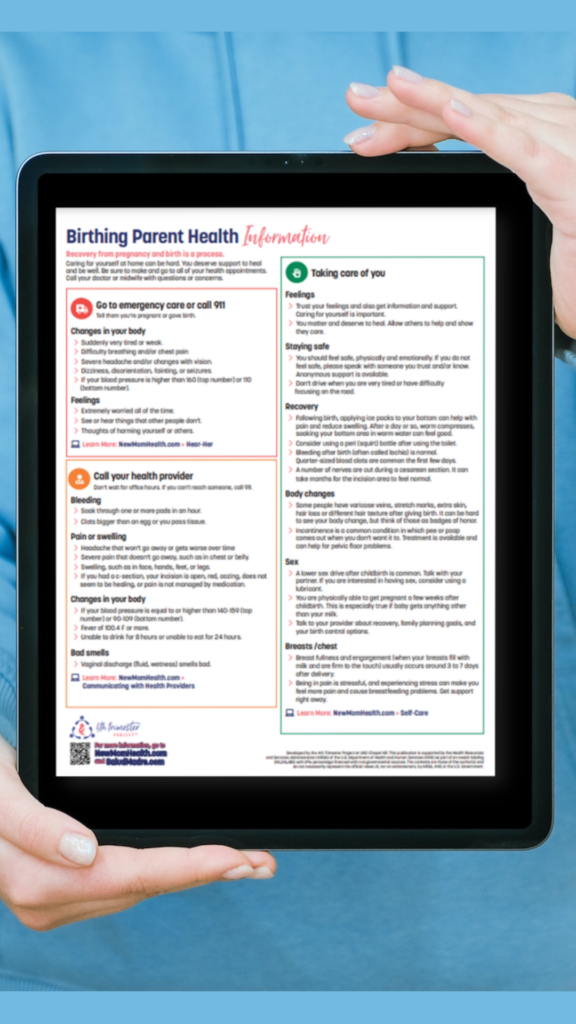
Did you know some health problems after giving birth are life-threatening and can happen up to a year after you have a baby?
The 4th Trimester Project has collaborated with the CDC Hear Her campaign to support new mothers and people who care about them to recognize signs and symptoms of urgent maternal health problems that need attention. Campaign materials were adapted and updated with North Carolina resources and information.
Support new moms and make sure they get the care they need. Recognizing when something isn’t right and taking urgent action could save Mom’s life.
Knowing When to Call 911 and When to Call Your Provider
Postpartum Red Flags: When to call 911
Video part 1: When to call 911 –
maternal health warning signs that are urgent and considered a medical emergency.
Get help right away.
Emergency health symptoms
Go to emergency care or call 911 if you experience the following. Tell them you’re pregnant or gave birth.
- Changes in your body
- Suddenly very tired or weak.
- Difficulty breathing and/or chest pain.
- Severe headache and/or changes with vision.
- Dizziness, disorientation, fainting, or seizures.
- If your blood pressure is higher than 160 (top number) or 110 (bottom number).
- Feeling Extremely worried all of the time.*
- See or hear things that other people don’t.*
- Thoughts of harming yourself or others.*
- This does not cover all potential symptoms. If you feel something isn’t right, contact a health care provider right away.
- *In addition to calling 911, for mental health emergency support, be sure to call 988 (suicide hotline), and/or the maternal mental health hotline or PSI hotline – FREE, 24/7, anonymous in Eng/Spanish via text, chat, phone, and mobile app.
Postpartum Red Flags: When to call your provider
Video part 2: When to call your provider – maternal health warnings signs where you need to urgently contact and connect with a health care team member and address with your provider.
Symptoms to address with a provider
Call your health provider – Don’t wait for office hours. If you can’t reach someone, call 911.
- Bleeding Soak through one or more pads in an hour.
- Clots bigger than an egg or you pass tissue.
- Pain or swelling Headache that won’t go away or gets worse over time.
- Severe pain that doesn’t go away, such as in chest or belly.
- Swelling, such as in face, hands, feet, or legs.
- If you had a c-section, your incision is open, red, oozing, does not seem to be healing, or pain is not managed by medication.
- Changes in your body If your blood pressure is equal to or higher than 140-159 (top number) or 90-109 (bottom number).
- Fever of 100.4 F or more.
- Unable to drink for 8 hours or unable to eat for 24 hours.
- Bad smells Vaginal discharge (fluid, wetness) smells bad.
- This does not cover all potential symptoms. If you feel something isn’t right, contact a healthcare provider right away.
New Parent Health Information One-pagers

The 4th Trimester NC MHI team has created health information one-pagers for birthing parents and for new baby. This document is helpful for new parents and people around them to recognize important warning signs AND who and when they should call for help. Print this one-page sheet on the urgent maternal health warning signs and symptoms. Stick it on your refrigerator or somewhere anyone who cares for mom can easily learn about and recognize the signs.
Training for Families
Watch this brief training for family members/communities to know what to look for and what to do if a birthing person is experiencing warning signs.
Additional Materials and Resources
CDC’s Hear Her campaign seeks to raise awareness of potentially life-threatening warning signs during and after pregnancy and improve communication between patients and their healthcare providers. A CDC campaign one-pager (left) that visually represents the 15 urgent maternal warning signs developed by the Council on Patient Safety in Women’s Health Care is now available in the following languages: English, Spanish, Arabic, Bengali,Chinese- Simplified, Chinese- Traditional, French, German, Haitian- Creole, Korean, Portuguese, Russian, Nepali, Swahili, Somali, Tagalog, Vietnamese
North Carolina Maternal Health Innovation team is proud to partner with Hear Her and adapt campaign materials to support awareness for expecting and new parents, supporters, and care teams in North Carolina, including:
- Postpartum Planning Tool (In Spanish)
- Health Information One-Pager for Birthing Parent (In Spanish)
- Taking Care of You booklet (In Spanish)
- My Care Team / Communicating with My Care Team
- Maternal mental health hotline: 1-833-9-HELP4MOMS
- 988 – Suicide hotline
Review “When to call for help” – this page helps you learn when it may be a medical emergency when to call a provider, and details about urgent maternal health warning signs.

